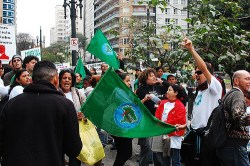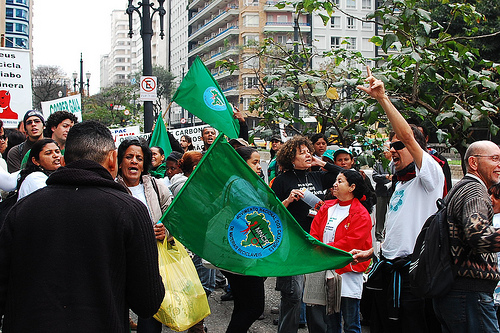
Catadores, or trash pickers, fight for their rights. (Photo by Paulo Teixeira.)
“I am the son of a catadora,” begins João Paolo de Jesus, sounding like someone who has told his life story a few times before. “I lived around the open pit dump from the time I was 7 until I was 11 or 12.”
João Paolo’s mother was a trash picker, one of thousands of people in Brazil who subsist by sifting through society’s castoffs, gleaning copper, aluminum, plastics, and paper for sale to scrap dealers and recycling companies. The two of them lived near an open dump in Salvador, Brazil’s third-largest city. At 26, João Paolo has taken up the trade as well, and he is working to build pride and legitimacy for catadores locally and across the country.
The effort has brought João Paolo and several dozen other catadores to Rio this week under the banner of the National Movement of Collectors of Recyclable Materials — the Movimento — for the People’s Summit, a grassroots alternative to the Rio+20 Earth Summit.
Catadores often subsist on less than $250 a month and live in the country’s ubiquitous favelas, or slums. Still, they have been dismayed by the living conditions here in Rio. People’s Summit attendees have been housed in a squalid encampment that turned to a muddy morass as a steady rain fell through Wednesday night.
“Members of the Movimento are staying in unsanitary conditions. The bathrooms are incredibly filthy,” João Paolo said through a translator Thursday. “The food is terrible. Many companheiros have food poisoning.”
The scene is a stark contrast to the heavily guarded compound on the city’s far fringe where the official Earth Summit proceedings are taking place. There, besuited dignitaries and delegates bustle between air-conditioned tents and prefabricated buildings, wielding cell phones and laptops, sipping espresso and bier served by Brazilian waitresses dressed as German bar wenches. Special buses shuttle officials between the summit and hotel rooms that soared to nearly $500 a night as the summit approached.
The situation is evidence of the void that exists between this city’s gritty reality and the face that it is putting on for the world as it hosts a series of mega-events, including the Earth Summit, the 2014 FIFA World Cup, and the 2016 summer Olympics. It is also a glimpse of the challenges the world’s cities will face as they struggle to accommodate another 2 billion people by mid-century. All of these people will need food, clean water, jobs, and decent housing.
Still, if the People’s Summit is a cautionary tale, it is also a spectacle of human diversity. Stretched along roughly a half-mile of beachfront just off downtown, the summit is a combination political action encampment and massive bazaar. Dozens of tents house lectures and discussion circles covering everything from women’s rights to nuclear power and rainforest logging. In the grass in between, craftspeople have laid out blankets arrayed with baskets and wooden bird whistles, organic fruit and nuts, toy dart guns, and plastic Elvis figurines.
Members of indigenous tribes strolled the pathways in elaborate, multicolored headdresses, geometric designs tattooed across their arms, chests, and faces. A band of singers, including a man wearing a black Guy Fawkes mask, the adopted trademark of the Occupy movement, raised a righteous ruckus. The air is laced with cigarette smoke, sea salt, and sewage, and alive with the sounds of drums, bicycle bells, and cell phone ringtones.
The People’s Summit, funded in part by the Brazilian government, has been a forum for rainforest tribes, labor unions, feminists, Occupiers, and conservationists to air their concerns about the Earth Summit proceedings and the planet’s current course. Vandana Shiva and other counterculture luminaries have made appearances. And Wednesday, the summit spawned a march, thousands strong, through downtown Rio.
And then there are the catadores, whose work was pushed into the spotlight by the Oscar-nominated 2010 documentary film Waste Land. They’ve been in the news lately because, just weeks before the Earth Summit, Rio made good on a years-old promise to close the Jardim Gramacho dump, a mountain of trash that loomed over, and leached pollution into, one of the city’s scenic bays.
The more than 1,700 people who worked in the dump will get a one-time payment from the government of about $7,500. Many will no doubt continue to pick trash, a fallback vocation for many of the developing word’s urban poor. While catadores in dumps get much of the media attention, many work the streets, sifting through garbage cans and dumpsters, and hauling recyclables away from shops and grocery stores.
Meantime, the members of the Movimento are tolerating awful conditions in order to have a chance to spread the word about their work and exchange notes with others in the field, many of whom have banded together in cooperatives in recent years as a defense against the predations of unscrupulous middlemen and scrap dealers. They are also campaigning against garbage incinerators, which both undermine their livelihood and pump poisons into the air.
Slowly, these catadores are trying to help their companheiros shed the stigmas that come with rummaging through other people’s garbage for a living. Their treatment here hasn’t helped.
Still, João Paolo de Jesus is philosophical. “After an experience like this, for all of us, it’s something we’re going to learn from,” he says. “What do the next 20 years look like? Government action or action of the people? This is something the social movements need to reflect on right now.”
This story would not have been possible without the guidance, knowledge, and translation of Meghan Mooney, a Fulbright Scholar researching social inclusion of catadores in Salvador, Brazil.



